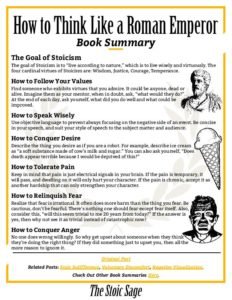In “How to Think Like a Roman Emperor,” Donald Robertson takes us through the life of Rome’s last good emperor, Marcus Aurelius.
Throughout this journey, Robertson uses Marcus Aurelius’s life to demonstrate many Stoic ideas that the emperor himself believed in.
As a cognitive-behavioral psychotherapist, Robertson also makes many connections between the practices of Stoicism and CBT (cognitive behavior therapy).
In this post, we will go over the goal of Stoicism, how to follow your values, how to speak wisely, how to conquer desire, how to tolerate pain, how to relinquish fear, and how to conquer anger.
You can get a free one page PDF version of this book summary here.
Contents
The Goal of Stoicism
“If ancient philosophers were veritable warriors of the mind, their modern counterparts had become more like librarians of the mind.” – Donald Robertson
Believe it or not, philosophy was originally used to help people live better lives. The word ‘philosophy’ came from the Greek word ‘philosophos’ which means ‘love of wisdom.’
However, in the 21 century, philosophy has become all about academics rather than practicality. It has become a study of complicated theories and books for the sake of theorizing about life without putting anything to practice.
Stoicism, however, remains one of the few schools of philosophy that focuses on applying its teachings to real life.
So, what is Stoicism all about?
In a nutshell, the goal of Stoicism is to live in agreement with nature, human nature, more specifically. To the Stoics, that meant to live wisely and virtuously.
If you are reading this, chances are, you are a member of the human species. A homo sapien, which is Latin for ‘wise man.’
Us humans are first and foremost thinking creatures.
Whenever you do anything, you are either operating on instinct or rationality. Most animals operate on instinct, which is to say they don’t make their decisions; their biology makes it for them.
Some animals, such as dogs, or dolphins, can learn simple skills and make decisions based on some level of thinking.
But no animal’s brain is nearly as complicated as the human brain; in fact, there is no structure in the known universe more complex than the human brain. Our ability to think is second to none.
“Our ability to think rationally is what makes us human.” -Donald Robertson
Another thing that makes us unique as humans is our complex social system. So on top of being thinking creatures, we are also social creatures.
Therefore, to live in agreement with nature, according to Stoicism, is to live rationally and to use the ability of reasoning to better our society.
Moreover, Stoicism also has four cardinal virtues to live by: Wisdom, Justice, Courage, Temperance.
Wisdom allows us to make better decisions that are logical and improves the lives of others and ourselves.
Justice is being fair and kind to others and treating them with dignity.
Temperance helps us control our desires and become more disciplined.
Courage is the ability to act accordingly in the face of adversity, to face our fears and failures with equanimity.
How to Follow Your Values
“Without a ruler to do it against, you can’t make crooked straight.” – Seneca
To live wisely and virtuously, you must form a clear and concise picture of what living wisely and virtuously look like. After all, you cannot hit a target if there isn’t one.
This is where the idea of a Stoic sage comes in. A Stoic sage is someone who is perfectly rational and virtuous at all times. Obviously, such a person does not exist, but that’s the point, it’s a role model for all aspiring Stoics to look up to.
However, for the purposes of following your values, your image of a ‘Stoic sage’ can be anyone who has virtues that you wish to exhibit.
“Your first step is to write down the virtues exhibited by someone you respect. Listing the qualities you most admire in another person… ” – Donald Robertson
It could be someone from history such as Marcus Aurelius or Epictetus, it could be someone alive today such as Tim Ferriss or Keanu Reeves, or it could be someone you personally know, such as your mother or a teacher you had.
For example, my role model is Richard Turner. Although he is not a Stoic, he exhibits many Stoic qualities. He has been blind since a teenager, but instead of letting that defeat him, he kept on doing what he loved; and now he is a 6th-degree karate black belt and one of the greatest card magicians of all time. He practices 16 hours a day and has never missed a workout in 40 years.
I wish to become more disciplined, hence why I have chosen Richard Turner to be my guide.
Whichever aspect of your life you want to improve in, find someone who you admire in that aspect and make them your image of the sage.
The idea is to either imagine that person as your mentor or imagine that person is always looking over your shoulder. When in doubt, ask, “what would they do?”
Ask yourself each night did you live up to that person’s display of virtue? What part did you do well? What aspect could you improve?
The point is not to judge ourselves and feel bad about our flaws but to constantly remind ourselves of the goal.
You are trying to exhibit the virtues you look up to in your role model, but you should only compare yourself to who you were yesterday, not who someone else is today.
How to Speak Wisely
“Better to trip with the feet than with the tongue” – Zeno of Citium (founder of Stoicism)
A philosopher today is someone very knowledgeable in different philosophies. They like to use sophisticated language. They spend a lot of time reading philosophical texts and concocting their own interpretations of philosophy, while rarely putting their theories to use.
An ancient equivalent of the modern-day philosopher is a sophist. Back in Marcus Aurelius’s time, a philosopher focuses on living wisely, while a sophist is more focused on speaking wisely, for the sake of it.
As Roberstons states, sophists made “the appearance of wisdom became more important to many Romans than wisdom itself.”
Therefore, for a Stoic, to speak wisely should always be secondary to living wisely. However, sometimes the manner of which you speak can influence your thoughts and actions.
For example, if you have a habit of complaining, that could influence you to always focus on the negative side of an event even if you didn’t mean to.
“‘This job is complete bullshit!’ People tend to think that exclamations like these are a natural consequence of strong emotions like anger. But what if they’re also causing or perpetuating our emotions?” – Donald Robertson
The Stoics believed that it is not the event itself that makes us feel certain negative emotions, but our judgment of the event.
If you like to use negative language, that will influence you to form negative conclusions before you even have the chance to think rationally.
To combat this, Robertson suggests we should try to be objective in our use of language. This doesn’t mean you have to speak like an emotionless robot, but you should use less emotive language to describe ‘negative’ events.
For example, if you get a flat tire while on your way to a job interview, instead of saying “why does it have to be now? This is awful!” Try saying, “I got a flat tire, now I am going to miss the job interview. So be it.”
But doing this, you will become less attached to external events, and as a by-product, you will also gain more respect from others (not that it should matter to a Stoic).
Here are the five ‘virtues’ of speech according to the Stoic, Diogenes Laertius, which Robertson listed out in the book:
- Correct grammar and good vocabulary
- Clarity of expression, making the ideas easily understood
- Conciseness, employing no more words than necessary
- Appropriateness of style, suited to the subject matter and also to the audience
- Distinction, or artistic excellence, and the avoidance of vulgarity
How to Conquer Desire
“Evil can be easily found, and freely; Smooth is the road, and very near she dwells. But sweat the gods have set upon the way to goodness: long and steep it is, and rough at first; but if you reach the summit, thereafter it is easy, hard though it was.” – Hesiod
It is a common misconception that the Stoics avoided pleasure; what the Stoic avoided was excess. Only when pleasure stands in the way of virtue, should it be avoided.
For example, if you are trying to lose weight and you have been offered a donut, you should reject it. It is pleasurable to eat that donut, but it would mean you are giving up the Stoic virtue of temperance (discipline).
Virtue is its own reward.
In an ancient parable called The Choice of Hercules, young Hercules was walking down a path when he encountered a crossroads. On the left, the goddess of virtue appears; on the right, the goddess of vice appears.
Kaia, the goddess of vice, tells Hercules that her name is happiness. She promises Hercules a life of pleasure, he will not have to work a day in his life; he can eat all that he wants and sleep with as many people as he desires. And he will live out his life without ever encountering hardship.
Arete, the goddess of virtue, tells Hercules that if he chooses to follow her, his life will be extraordinarily challenging. He will be constantly faced with adversities and pain. But in the end, he will experience true joy and wisdom, and he will achieve greatness.
Hercules chose the path of virtue and went on to become a hero of Rome.
Robertson makes the observation that Marcus Aurelius’s life is a perfect demonstration of the choice of Hercules.
As a Roman emperor and possibly the most powerful man on earth at the time, Marcus Aurelius could have had anything he desired. But instead, he stuck with the Stoic path and chose virtue over pleasure whenever necessary.
His brother and co-emperor, Lucius Verus, on the other hand, always chose pleasure over virtue. Whether it was caused by his excess or not, and despite being the younger and much healthier brother, Lucius died when he was only 38, while Marcus Aurelius lived to be 58.
Marcus Aurelius became one of the greatest emperors and philosophers of all time, while Lucius remains a footnote in history.
One of the methods Marcus used to conquer desire, which has now been adopted by CBT, is cognitive distancing.
Cognitive distancing is essentially distancing yourself from your thoughts and seeing things objectively as an outsider.
Whenever an unhealthy desire arose, Marcus would describe it in the plainest language and object terms.
For example, he described sex as the “friction of a piece of gut and following a sort of convulsion, the expulsion of some mucus.”
Describing things objectively helps to resist the temptations of unhealthy desires. Not that sex is always an unhealthy desire.
Try this out the next time you are faced with a temptation, such as a donut instead of a workout, or watching YouTube instead of working.
This will help you see your desires objectively and realize that it’s often not worth pursuing.
Marcus Aurelius would also ask himself, “Does death appear terrible because I would be deprived of this?”
Does death appear terrible because you would be deprived of YouTube? Or does death appear terrible because you would be deprived of the chance to achieve greatness?
Voluntary discomfort can also be a great way to conquer desire.
“We can’t flourish as human beings and achieve things we can be proud of until we endure certain feelings of pain or discomfort or forgo certain pleasures.” – Donald Robertson
You can get a free one page PDF version of this book summary here.
How to Tolerate Pain
“Do not let us build a second story to our sorrow by being sorry for our sorrow.” – Paul Dubois (Swiss psychiatrist & neuropathologist)
Marcus Aurelius was notoriously frail. He suffered from chronic chest and stomach pains, he had problems sleeping and could barely stomach food; and yet, he was incredibly resilient and was not enslaved by his physical conditions.
He’s ability to endure pain was attributed to his practice in Stoicism.
As mentioned, the Stoics believed that things of themselves are neither good or bad, but rather our judgments of it. The same goes for pain.
Pain is not bad; pain is indifferent, neutral. It is our perception of it that makes it good or bad.
For example, we perceive the pain of exercising, taking a cold shower, or childbirth, as good. While the pain of a broken bone or a fever is bad.
However, with the right mindset, anyone can endure pain by not judging it as a terrible misfortune.
“Pain and discomfort can become advantages in life if they provide opportunities for us to develop our strengths.” – Donald Robertson
Once again, cognitive distancing can be used here; you can describe your pain as nerve endings sending electrical signals to your brain that a part of your body is being hurt, it is just a program in your biology.
You must also realize that the fear of pain or your perception of it can often do more harm than the pain itself.
If the pain is temporary, it will pass, and dwelling on it will only hurt your character.
If the pain is chronic, make peace with it, accept it as another hardship that can only strengthen your character.
Imagine pain as leaving the tip of an ink pen on a piece of paper. The more you focus on it, the more the ink spreads. But if you simply leave it alone, the pen leaves the paper, and the ink dries, no longer causing damage.
If you wish to learn more about how you can use Stoicism to deal with pain and hardship, check out this article.
How to Relinquish Fear
“What would have become of Hercules do you think if there had been no lion, hydra, stag or boar – and no savage criminals to rid the world of?” -Epictetus
During his reign, Marcus Aurelius was faced with many challenges.
One of the biggest challenges was during the start of the Marcomannic Wars, Marcus was left with no choice but to take over direct command of his entire army of 140,000 men when Lucius died.
The problem was Marcus Aurelius had zero military experience and had no idea how to command an army.
In Roberson’s words, “it must have been incredibly daunting. Yet he embraced his new role completely and turned it into an opportunity to deepen his Stoic resolve.”
Throughout the decade long war, Marcus wanted to get away from all the stress and retreat into the country-side many times.
But he reminded himself that true inner peace comes from our thoughts rather than pleasant surroundings.
Much like happiness, inner peace is not influenced by external circumstances; it comes from the quality of our thoughts.
Most of the time, fear does us more harm than the thing we fear. Take death, for example, does fearing death benefit you?
No, if anything, fearing death can stop you from living fully.
So if even death shouldn’t be feared, why should you be fearful of anything?
Besides, most of the time, the thing we fear in our day to day life is a lot more trivial than death. Such as a breakup or losing our job.
However, it’s important to know that being cautious is not the same as being fearful. There are many things you should be cautious of, but almost nothing you should fear.
One could even say that all fear all irrational.
“If this will seem trivial to me 20 years from now, then why shouldn’t I view it as trivial today instead of worrying about it as if it’s a catastrophe.” – Donald Robertson
Think about some of the things that you fear today, and consider whether it will matter in the long run; most likely, the answer will be no.
Many Stoic exercises can help with dealing with fear, such as Stoic Indifference, or voluntary discomfort.
“The only thing we have to fear is fear itself.” – Franklin D. Roosevelt
How to Conquer Anger
“The wise man will not get upset about things that lie beyond his direct control, such as other people’s actions.” – Donald Robertson
After the end of the Marcomannic Wars, Gaius Avidius Cassius, a Roman general who was the second most powerful man in Rome, declared himself emperor. By doing so, Cassius had declared a civil war.
In an incredible feat of Virtue, Marcus forgave all the rebel legions who sided with Cassius. And before any battle even began, Cassius was assassinated by his own men.
Marcus then pardoned all the cities that had sided with the usurper and made sure that Cassius’s family could live under his protection.
However, Marcus Aurelius did not start out like the benevolent emperor we know him as today. When he was young, he had trouble controlling his anger. But through his practice in Stoicism, Marcus has learned to conquer anger.
One of the most useful techniques for managing anger is to realize that no one does wrong willingly.
Marcus knew that either Cassius thought Marcus was dead because of rumors of his deteriorating health, or Cassius thinks he would make a better emperor.
Either way, Cassius believes he is doing the right thing.
If someone thinks they’re doing the right thing, why should you be upset by it?
“No man does evil knowingly, which also entails that no man does it willingly.” – Donald Robertson
If someone does something purely for the sake of upsetting you, all the more reason to ignore it, for ignoring them is the best revenge.
However, you must keep in mind there are initial feelings that cannot be controlled. That’s the animal part of us, our instincts, but what matters is how we react after the instinctive anger (or any emotion) has passed because that’s the thinking part, the part that makes us human.
“We don’t control our initial reaction, perhaps, but we do control how we respond to it: it’s not what happens first that matters but what you do next.” – Donald Robertson
Another Stoic belief is that you should never be surprised by anything in life because life is unpredictable by nature. The unpredictability of life is what makes it exciting.
Anger is a form of surprise. If you expected someone to betray you, you wouldn’t be angry about it when it happens; you might be disappointed at best, which is not nearly as harmful as anger.
Therefore, keeping in mind that nothing in life should be surprising to you will help prevent or control anger. The Stoic exercise of negative visualization can be very useful for this.
“The wise man who views the world rationally is never surprised by anything in life.” – Donald Robertson
Don’t Be a Sophist, Be a Stoic
With all these techniques you can now use to improve your life and your character, you mustn’t treat this as “just another article.”
Put these methods to use, go improve your life.
“Change won’t leap off the page. It only comes by making a firm decision, here and now, to begin putting ideas like these into practice.” – Donald Robertson
Related Posts:
Best Quotes From How to Think Like a Roman Emperor
How to Be Invincible in Life – A Stoic Guide on Indifference
How Voluntary Discomfort Can Change Your Life
How Negative Visualization Can Change Your Life (Premeditatio Malorum)
Best Ideas from Man’s Search for Meaning by Viktor Frankl
If you need a reminder of these ideas and techniques, we’ve made a free one page PDF summary of How to Think Like a Roman Emperor for you:































